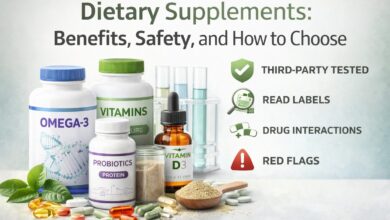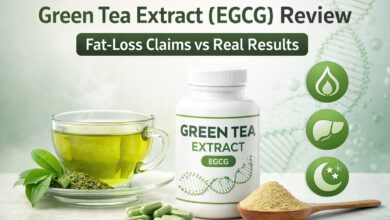
In the world of nutrition and wellness, few supplements are as well-researched and widely praised as omega-3 fatty acids. These essential fats play a vital role in brain function, heart health, and overall body balance.
Yet, many people still struggle to get enough omega-3 through diet alone — that’s where omega-3 supplements come in.
This article breaks down everything you need to know about omega-3s: their benefits, the different types available, and how to choose the best one for your goals.
What Are Omega-3 Fatty Acids?
Omega-3s are a group of essential polyunsaturated fatty acids that the body can’t produce on its own. The three main types are:
-
EPA (Eicosapentaenoic Acid) – supports heart health and reduces inflammation.
-
DHA (Docosahexaenoic Acid) – crucial for brain development and cognitive function.
-
ALA (Alpha-linolenic Acid) – found in plants, converted into EPA and DHA in small amounts.
The richest dietary sources of omega-3 include fatty fish (like salmon and sardines), flaxseed, chia seeds, and walnuts. However, since not everyone consumes these foods regularly, supplements have become an essential alternative.
Top Health Benefits of Omega-3 Supplements
1. Promotes Heart Health
Omega-3s help lower triglyceride levels, reduce blood pressure, and prevent plaque buildup in arteries. Studies show that regular omega-3 intake may lower the risk of heart disease and stroke.
2. Boosts Brain Function and Memory
DHA, a key omega-3 component, is essential for brain cell membranes. Research suggests that omega-3 supplementation improves focus, memory, and may reduce symptoms of depression and anxiety.
3. Supports Joint and Inflammatory Health
Omega-3s act as natural anti-inflammatories, reducing joint stiffness and pain — especially beneficial for people with arthritis.
4. Improves Skin and Eye Health
These fatty acids help maintain skin moisture, reduce acne, and prevent dry eyes by supporting the tear film layer.
5. May Support Pregnancy and Infant Development
DHA is vital for fetal brain and eye development, making omega-3 supplements important for pregnant and breastfeeding women.
Types of Omega-3 Supplements
There are several forms of omega-3 supplements, each with unique benefits:
1. Fish Oil
The most popular form, fish oil contains high levels of EPA and DHA. Look for purified, mercury-free brands with third-party testing.
2. Krill Oil
Derived from tiny crustaceans, krill oil contains both EPA and DHA in a phospholipid form that may be easier for the body to absorb.
3. Algae Oil (Vegan Source)
A sustainable, plant-based option ideal for vegetarians and vegans. Algae oil directly provides DHA (and sometimes EPA) without involving fish.
How to Choose the Best Omega-3 Supplement
When shopping for omega-3 supplements, consider the following:
-
Check Purity and Source:
Ensure the product is free from heavy metals and pollutants. Look for “IFOS certified” or “third-party tested” labels. -
Look at EPA/DHA Content:
A high-quality supplement should contain at least 500–1,000 mg combined EPA and DHA per serving. -
Choose Triglyceride or Phospholipid Form:
These are more bioavailable than ethyl ester forms, meaning your body absorbs them better. -
Consider Sustainability:
Brands using responsibly sourced fish or algae are better for the planet — and often higher in quality.
Recommended Dosage
Most experts recommend:
-
250–500 mg of combined EPA and DHA daily for general health.
-
1,000–3,000 mg daily for those managing high triglycerides or inflammation (consult your doctor first).
Take your omega-3 supplement with meals that contain fat to enhance absorption.
Potential Side Effects and Safety
Omega-3 supplements are generally safe for most people, but some may experience:
-
Mild digestive discomfort
-
Fishy aftertaste (use enteric-coated capsules to avoid this)
-
Thinner blood at high doses
Always consult a healthcare provider if you’re taking blood thinners or preparing for surgery.
Conclusion
Omega-3 supplements are among the most valuable additions to a healthy lifestyle. Whether you’re looking to improve heart health, boost brain function, or simply enhance overall wellness, they offer science-backed benefits for everyone.
Just remember — not all supplements are created equal. Choose high-quality, tested brands and pair them with a balanced diet for maximum results.
Suggestions
-
-
“Top 10 Proven Health Benefits of Omega-3 Supplements”
-
“Fish Oil vs Algae Oil: Which Omega-3 Supplement Is Better?”
-
“Best Time to Take Omega-3 Supplements for Maximum Absorption”
-
“Magnesium Supplements: Why They Matter for Muscle and Nerve Health”
-




